1. Overview
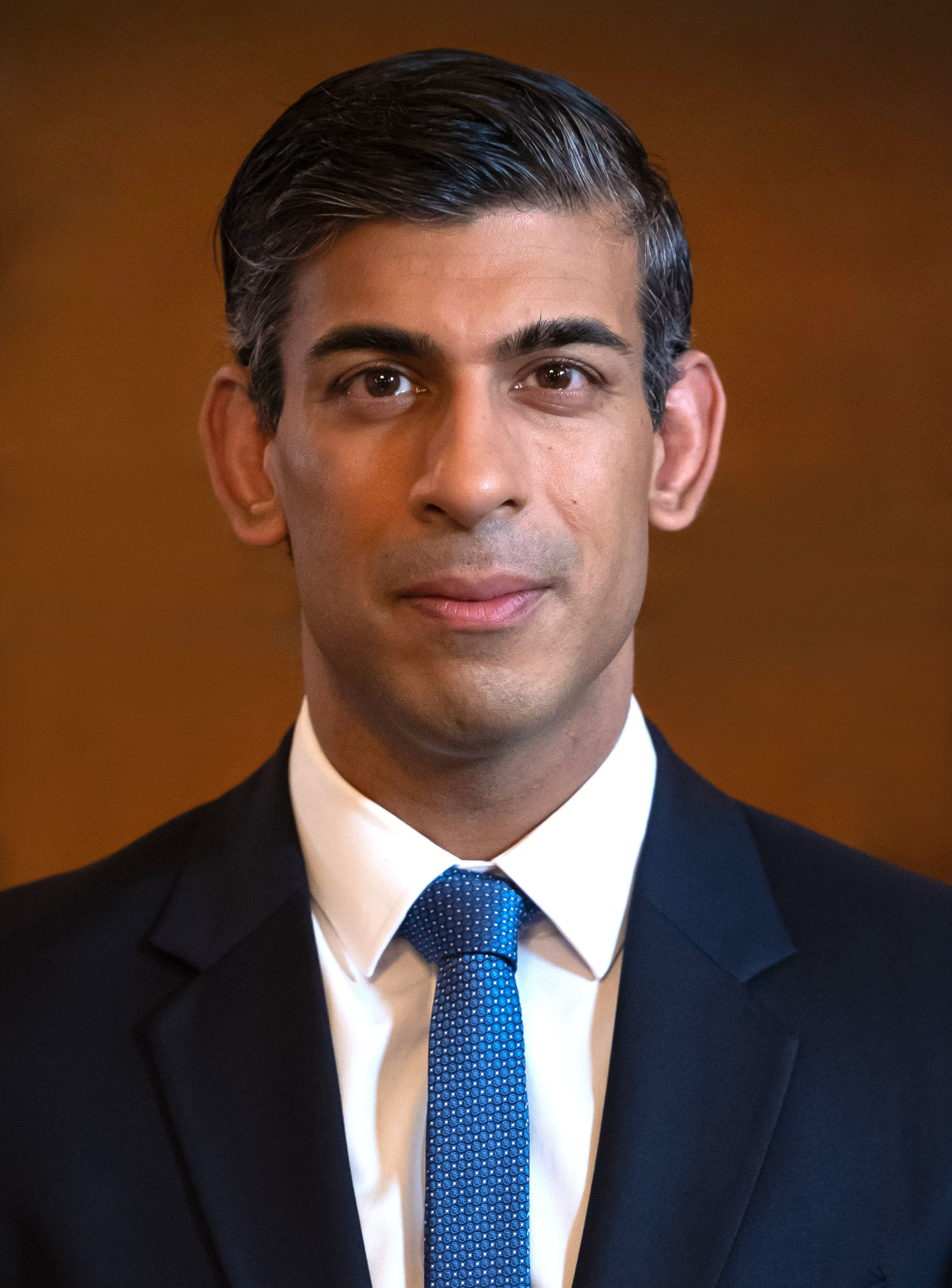
Rishi Sunak (Rishi SunakRISH-ee SOO-nakEnglish, ऋषि सुनकRISH-ee SOO-nakHindi, ਰਿਸ਼ੀ ਸੁਨਕRISH-ee SOO-nakPanjabi) is a British politician who served as Prime Minister of the United Kingdom and Leader of the Conservative Party from October 2022 to July 2024. Following the Conservative Party's significant defeat in the 2024 general election, he briefly served as Leader of the Opposition from July to November 2024. Born on 12 May 1980 in Southampton, Hampshire, to parents of Indian descent who immigrated to Britain from East Africa in the 1960s, Sunak's background reflects a blend of cultural heritage and British upbringing. He received a prestigious education at Winchester College, Oxford University (where he studied Philosophy, Politics and Economics), and Stanford University, earning an MBA as a Fulbright Scholar. His professional career began in finance, including roles at Goldman Sachs and as a partner at hedge fund firms, before he entered politics.
Sunak was first elected as a Member of Parliament (MP) for Richmond (Yorks) in 2015, a constituency he represented until boundary changes led to his election for Richmond and Northallerton in 2024. Early in his political career, he supported Brexit and served in junior ministerial roles under Prime Minister Theresa May, eventually becoming Chief Secretary to the Treasury under Boris Johnson. In February 2020, he was promoted to Chancellor of the Exchequer, a position in which he played a central role in the government's financial response to the COVID-19 pandemic, implementing schemes like the furlough and Eat Out to Help Out. His popularity initially soared but later declined amid the cost-of-living crisis. He resigned as Chancellor in July 2022 during a government crisis, subsequently losing the Conservative Party leadership contest to Liz Truss. However, following Truss's rapid resignation in October 2022, Sunak was elected unopposed, becoming the youngest Prime Minister since The Earl of Liverpool in 1812 and the first British Asian and Hindu to hold the office.
During his premiership, Sunak focused on stabilizing the economy, tackling inflation, and addressing issues such as illegal immigration through controversial policies like the Rwanda asylum plan. His government provided significant aid to Ukraine in response to the Russian invasion of Ukraine and navigated complex international relations, including the Israel-Hamas war. Despite his efforts, the Conservative Party faced heavy losses in local elections, culminating in a landslide defeat in the July 2024 general election, which ended 14 years of Conservative rule. After his resignation as Prime Minister, Sunak continued as Leader of the Opposition until a new party leader was elected.
2. Early Life and Education
Rishi Sunak's early life and education were marked by his family's immigrant background and a path through elite British and American institutions, experiences that significantly shaped his worldview and prepared him for a career in finance and politics.
2.1. Childhood and Family Background
Rishi Sunak was born on 12 May 1980, at Southampton General Hospital in Southampton, Hampshire, England. His parents, Yashvir and Usha Sunak, are of Punjabi Indian Hindu descent. His family's journey to Britain began in the 1960s when his grandparents immigrated from East Africa. His paternal grandfather, Ramdas Sunak, migrated from Gujranwala (located in present-day Pakistan) to Nairobi, Kenya Colony, in 1935, where he worked as a clerk. He was later joined by his wife, Suhag Rani Sunak, from Delhi, India, in 1937. Sunak's maternal grandfather, Raghubir Sain Berry, who was awarded the MBE, hailed from the village of Jassowal Sudan in the Ludhiana district (now in Punjab, India). He worked as a tax official in Tanganyika and married Sraksha, a Tanganyikan-born woman, with whom he had three children. The Berry family moved to the UK in 1966, with Sraksha funding the relocation by selling her wedding jewelry. In the UK, Raghubir Berry joined the Inland Revenue.
Sunak's father, Yashvir Sunak, was born and raised in the Kenya Colony in 1949 and became a general practitioner (GP) in the National Health Service (NHS). His mother, Usha Sunak, born in Tanganyika, is a pharmacist who owned the Sunak Pharmacy in Southampton from 1995 to 2014, holding a degree from Aston University. Rishi is the eldest of three siblings. His brother, Sanjay, is a psychologist, and his sister, Raakhi, works in New York City as the chief of strategy and planning at Education Cannot Wait, the United Nations Global Fund for Education in Emergencies and Protracted Crises.
During his childhood, Sunak's parents prioritized his education, and he has mentioned that his family did not have Sky TV growing up. During his summer holidays, he worked as a waiter at Kuti's Brasserie, a curry house in Southampton.
2.2. Education
Sunak's academic journey began at Stroud School, a preparatory school in Romsey. He then attended Winchester College, an independent boarding school for boys, as a dayboy, where he distinguished himself by becoming the head boy.
He pursued higher education at Lincoln College, Oxford, where he read philosophy, politics and economics (PPE), graduating with a first-class honours degree in 2001. During his time at Oxford, he undertook an internship at Conservative Campaign Headquarters and joined the Conservative Party.
In 2006, Sunak earned a Master of Business Administration (MBA) degree from Stanford University in California, attending as a Fulbright Scholar. It was during his studies at Stanford that he met his future wife, Akshata Murty.
3. Business and Financial Career
Before entering politics, Rishi Sunak built a significant career in the finance and investment sectors, gaining extensive experience in global financial markets.
From 2001 to 2004, Sunak worked as an analyst for the investment bank Goldman Sachs. Following his tenure there, he joined The Children's Investment Fund Management (TCI), a prominent hedge fund management firm, where he rose to become a partner in September 2006. He departed from TCI in November 2009.
Subsequently, Sunak reunited with former colleagues in California to co-found a new hedge fund firm, Theleme Partners, which launched in October 2010 with 700.00 M USD under management. At both TCI and Theleme Partners, his direct superior was Patrick Degorce. Additionally, from 2013 to 2015, Sunak served as a director of Catamaran Ventures, an investment firm owned by his father-in-law, the renowned Indian businessman N. R. Narayana Murthy, who founded Infosys.
4. Early Political Career
Rishi Sunak's entry into politics marked a transition from a successful career in finance to public service, beginning with his election as a Member of Parliament and progressing through junior ministerial roles.
4.1. Member of Parliament
In October 2014, Sunak was selected as the Conservative candidate for the Richmond (Yorks) constituency, succeeding the long-serving William Hague. This seat, known as one of the safest Conservative strongholds in the United Kingdom, had been held by the party for over a century. In the same year, Sunak served as the head of the Black and Minority Ethnic (BME) Research Unit at the center-right think tank Policy Exchange, where he co-authored a report focusing on BME communities in the UK.
He was first elected as an MP for Richmond (Yorks) in the 2015 general election, securing a significant majority of 19,550 votes (25.1%). During the 2015-2017 Parliament, he was a member of the Environment, Food and Rural Affairs Select Committee.
Sunak was a vocal supporter of the campaign to leave the European Union in the 2016 EU membership referendum, criticizing the EU's immigration laws and arguing that the UK was "discriminating against countries with whom we have ties of history, language and culture." In 2016, he authored a report for the Thatcherite think tank Centre for Policy Studies, advocating for the establishment of free ports after Brexit. The following year, he wrote another report promoting the creation of a retail bond market to benefit small and medium-sized enterprises. He also published a paper for Policy Exchange in 2017, highlighting the critical importance and vulnerability of the UK's undersea infrastructure.
Sunak was re-elected in the 2017 general election with an increased majority of 23,108 (40.5%). He secured a third re-election in the 2019 general election, further increasing his majority to 27,210 (47.2%). Following boundary changes, he won the newly formed seat of Richmond and Northallerton in the 2024 general election with a majority of 12,185 (25.1%).
4.2. Junior Ministerial Roles
Sunak's ascent within government began with his appointment as Parliamentary Under-Secretary of State for Local Government in Prime Minister Theresa May's second government, a role he held from January 2018 to July 2019 following the 2018 cabinet reshuffle. During this period, he consistently voted in favour of May's Brexit withdrawal agreement on all three occasions it was presented to Parliament, and notably voted against the proposal for a second referendum on any withdrawal agreement. May's agreement was ultimately rejected three times by Parliament, leading to her resignation in May 2019.
Following May's departure, Sunak actively supported Boris Johnson's successful bid to become the next leader of the Conservative Party. He co-authored an article in The Times in June 2019 alongside fellow MPs Robert Jenrick and Oliver Dowden, advocating for Johnson's candidacy during the leadership campaign. Upon Johnson's victory and appointment as Prime Minister, Sunak was promoted to the senior cabinet-attending role of Chief Secretary to the Treasury on 24 July 2019, serving under Chancellor of the Exchequer Sajid Javid. The very next day, he was sworn in as a member of the Privy Council. During the 2019 general election campaign, Sunak played a prominent role, representing the Conservatives in various debates.
5. Chancellor of the Exchequer (2020-2022)
Rishi Sunak's tenure as Chancellor of the Exchequer was largely defined by his leadership in the government's economic response to the COVID-19 pandemic and the subsequent cost-of-living crisis. His appointment came amidst a significant political reshuffle, and his policies aimed to stabilize the economy during unprecedented challenges.
In the weeks leading up to Boris Johnson's first cabinet reshuffle in February 2020, media briefings suggested the potential establishment of a new economic ministry led by Sunak, aimed at reducing the power and political influence of the Treasury. On 13 February 2020, the day of the reshuffle, then-Chancellor Sajid Javid resigned after Johnson demanded he dismiss all his Treasury advisers and replace them with individuals selected by 10 Downing Street. Javid publicly stated that "no self-respecting minister would accept those terms." Sunak was subsequently promoted to Chancellor to replace Javid. Some political commentators viewed Sunak's appointment as signalling the end of the Treasury's independence from Downing Street, with Robert Shrimsley of the Financial Times arguing that "good government often depends on senior ministers - and the Chancellor in particular - being able to fight bad ideas."
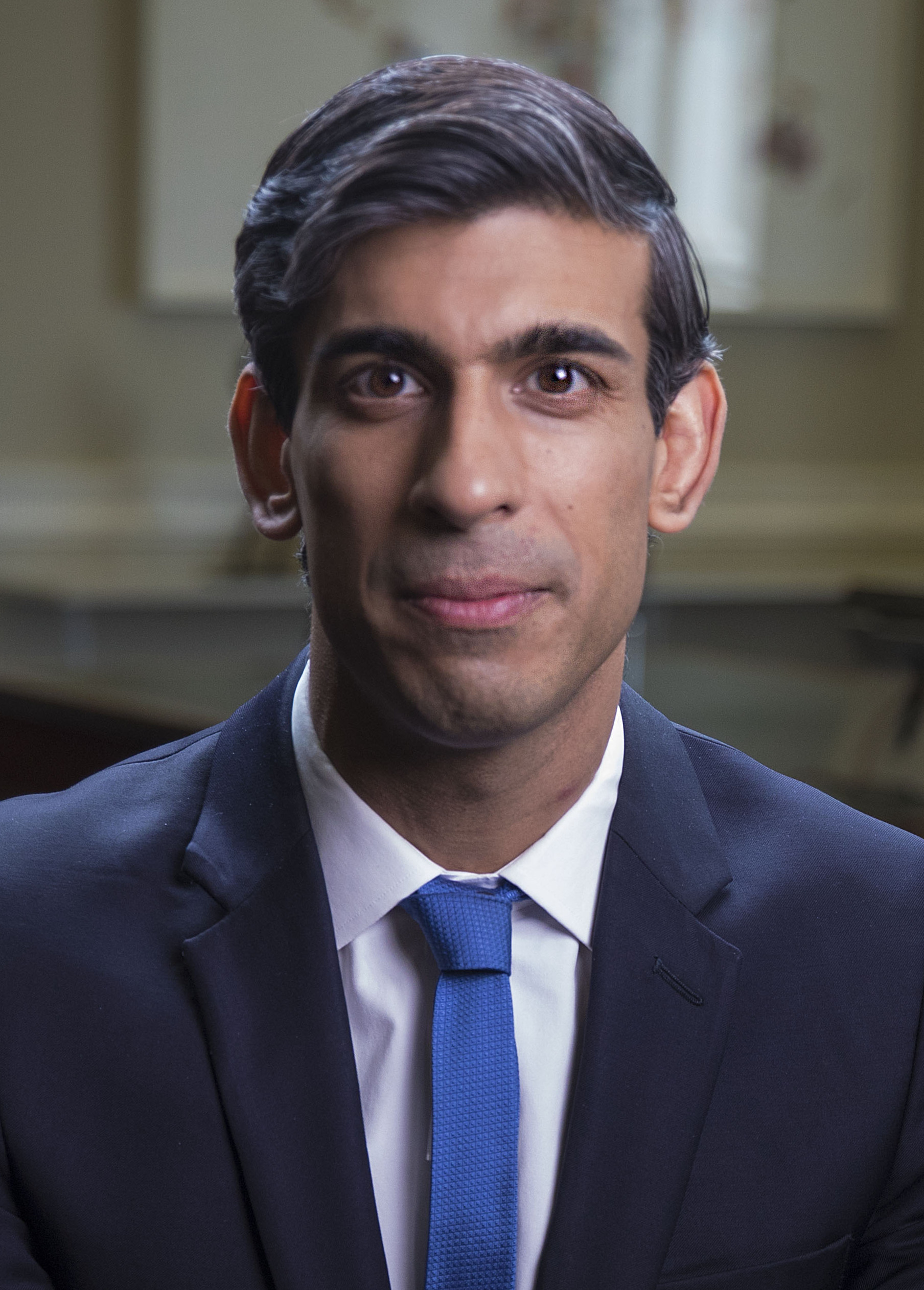
5.1. COVID-19 Pandemic Response
Sunak became a central figure in the government's response to the COVID-19 pandemic and its severe economic impact, particularly from 23 March 2020. Earlier, in January and February 2020, he had introduced advice for travellers from affected countries and initiated contact tracing, though the latter was later abandoned. Initially, the UK government resisted more stringent measures adopted by other European and Asian countries.
On 20 March 2020, Sunak delivered a notable statement on COVID-19, emphasizing compassion and collective effort: "Now, more than any time in our history, we will be judged by our capacity for compassion. Our ability to come through this, won't just be down to what government or businesses do, but by the individual acts of kindness that we show each other. When this is over, we want to look back on this moment and remember the many small acts of kindness done by us and to us. We want to look back on this time and remember how we thought first of others and acted with decency. We want to look back on this time and remember how, in the face of a generation-defining moment, we undertook a collective national effort - and we stood together. It's on all of us."
5.1.1. Furlough Scheme
Sunak introduced a comprehensive programme providing 330.00 B GBP in emergency support for businesses, alongside the Coronavirus Job Retention (furlough) scheme for employees. This marked the first time a British government had implemented such an employee retention scheme. The scheme, launched on 20 March 2020, provided grants to employers to cover 80% of a staff member's wage and employment costs each month, up to a maximum of 2.50 K GBP per person. It was estimated to cost 14.00 B GBP per month to operate.
Initially running for three months and backdated to 1 March, the furlough scheme was extended by Sunak until the end of June 2020 following a three-week extension of the nationwide lockdown. He further extended the scheme until the end of October 2020 to prevent or defer mass redundancies, company bankruptcies, and potential unemployment levels not seen since the 1930s. In March 2021, Sunak announced another extension, prolonging the scheme until September 2021. Despite its broad reach, the scheme faced criticism for not covering all workers, particularly those who started new jobs after the cut-off date. The Institute for Employment Studies estimated approximately 100,000 such individuals, while the British Hospitality Association put the figure between 350,000 and 500,000.
5.1.2. Eat Out to Help Out
In July 2020, Sunak unveiled a further 30.00 B GBP spending plan, which included a stamp duty holiday, a cut to value-added tax (VAT) for the hospitality sector, a job retention bonus for employers, and the "Eat Out to Help Out" scheme. This initiative aimed to support and create jobs in the hospitality industry. The government subsidized food and soft drinks at participating cafes, pubs, and restaurants by 50%, up to 10 GBP per person, available from 3 to 31 August on Monday to Wednesday each week. In total, the scheme subsidized 849.00 M GBP in meals.
The scheme's introduction was controversial, as Chief Scientific Adviser Patrick Vallance and Chief Medical Officer Chris Whitty were reportedly not informed of it until its public announcement, a claim Sunak's written evidence later contradicted, stating it had been discussed and not objected to. While some hailed the scheme as a success for boosting the hospitality industry, others disagreed. A 2020 study suggested the scheme contributed to an increase in COVID-19 infections, with estimates ranging from an 8% to 17% rise, a possibility that Boris Johnson acknowledged, though the Treasury rejected this link.
5.2. Economic Policies and Budgets
Sunak's chancellorship was marked by a series of budgets and economic strategies designed to navigate the UK through the economic fallout of the pandemic and the subsequent cost-of-living crisis.
He presented his first budget, titled "Delivering on Our Promises to the British People," on 11 March 2020. A planned autumn budget was later scrapped due to the COVID-19 pandemic, with Sunak stating it was not "the right time to outline long-term plans." Instead, he delivered additional statements in both summer and autumn.
The **Winter Economy Plan** was announced on 24 September 2020, aiming to promote economic recovery and preserve viable jobs and businesses. This plan was extended multiple times, ultimately until 30 September 2021. The **July 2020 Summer Statement**, also known as the coronavirus mini-budget, delivered on 8 July 2020, unveiled a 30.00 B GBP spending package. However, organizations including HM Revenue and Customs and the Institute for Fiscal Studies raised concerns about its impact and cost-effectiveness, and at least one major retailer declined to utilize a financial bonus scheme intended for rehiring furloughed employees.
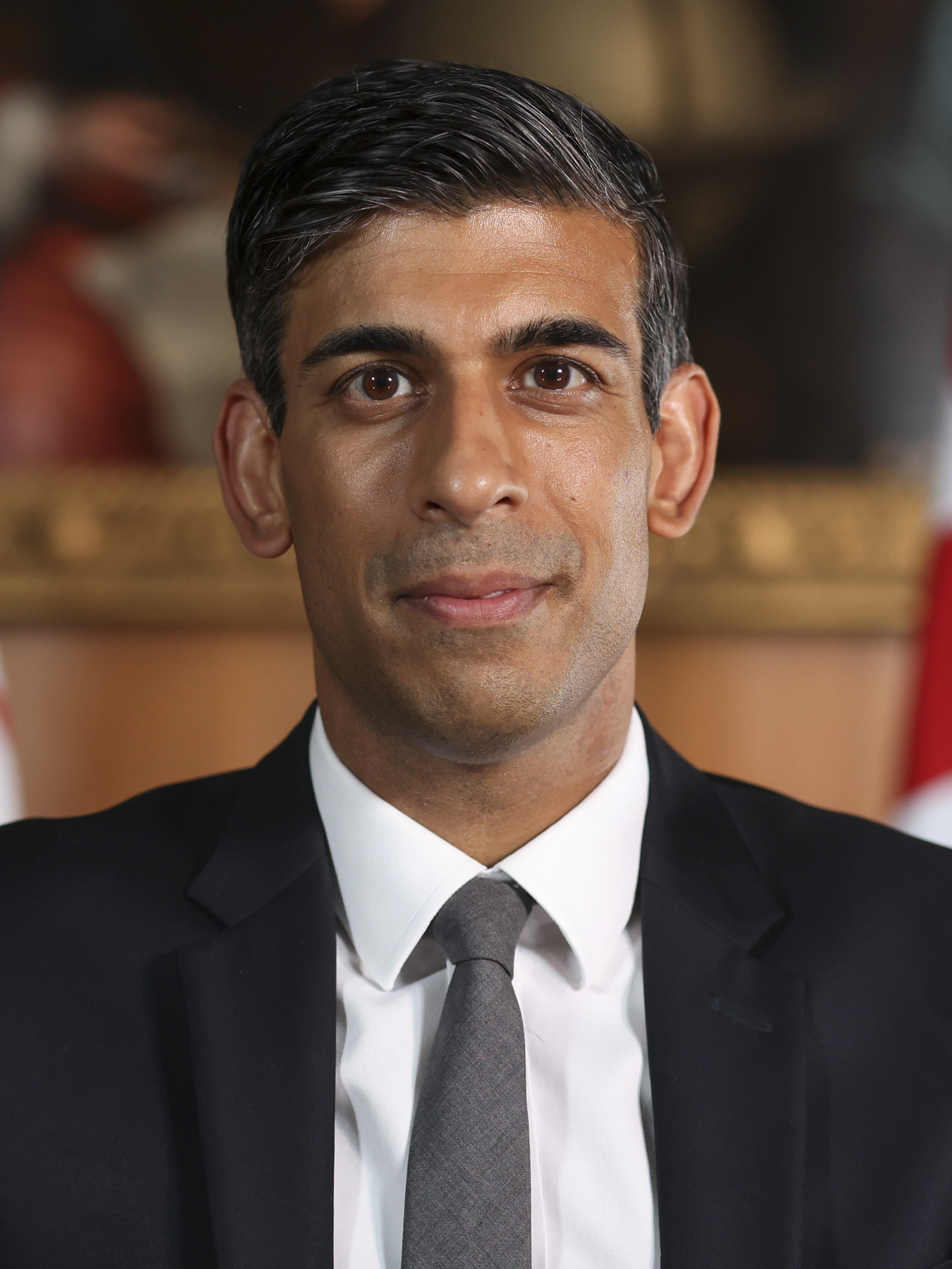
In his **March 2021 budget**, Sunak highlighted the severe economic impact of the pandemic, noting that 700,000 people had lost their jobs, the economy had shrunk by 10% (the largest fall in 300 years), and borrowing was at its highest outside wartime. This budget included a significant measure to increase the rate of corporation tax from 19% to 25% in 2023, making him the first Chancellor to raise this tax rate since Labour's Denis Healey in 1974. It also imposed a five-year freeze on the tax-free personal allowance and the higher rate income tax threshold, and extended the furlough scheme until the end of September.
Sunak delivered his third and final budget statement as Chancellor in **October 2021**. This budget included substantial spending commitments for science and education. It also increased in-work support through the Universal Credit system by raising work allowances by 500 GBP a year and reducing the post-tax deduction taper rate from 63% to 55%. An investment of 560.00 M GBP was announced for the Levelling Up White Paper. Many of the announcements were previewed before budget day, drawing criticism from the House of Commons. In response, Sunak stated that the budget "begins the work of preparing for a new economy."
His final budget as Chancellor, the **Spring Statement**, was made on 23 March 2022. He announced a cut to fuel duty, the removal of VAT on energy-saving equipment (such as solar panels and insulation), and a reduction in national insurance payments for small businesses. While proceeding with a planned national insurance rise in April, he promised to align the primary threshold with the basic personal income allowance from July. He also pledged a reduction in income tax in 2024 and provided some funding aimed at helping vulnerable people cope with the cost of living.
5.2.1. Cost of Living Crisis and Energy Crisis
Amidst the escalating cost of living and energy crises, Sunak intensified government efforts to respond in May 2022. He introduced a 5.00 B GBP windfall tax on energy companies to help fund a 15.00 B GBP support package for the public. This comprehensive package included a 400 GBP discount on energy bills for every household, in addition to a 150 GBP council tax refund that the government had already mandated. For approximately 8 million of the UK's lowest-income households, a further 650 GBP payment was announced. Additionally, pensioners and individuals with disabilities would qualify for extra payments, on top of the 550 GBP every household received, and the 650 GBP they would get if they had a low income.
5.2.2. Other Actions
As Chancellor, Sunak hosted a G7 summit in London in June 2021, where a tax reform agreement was signed. This agreement, in principle, sought to establish a global minimum tax on multinational corporations and online technology companies, a plan that the OECD later signed onto in October 2021.
In October 2021, Sunak attended COP26 in Glasgow. During his speech on 3 November, he expressed optimism despite daunting challenges and highlighted that by bringing together finance ministers, businesses, and investors, COP26 could begin to deliver on targets from the Paris Agreement. He outlined three key actions: first, the necessity of increased public investment, with the UK committing 100.00 M GBP to the "Taskforce on Access to Climate Finance" and announcing support for a new capital market mechanism to fund renewable energy in developing countries through the issuance of green bonds in the UK. Second, the mobilization of private finance, noting that the Glasgow Financial Alliance for Net Zero brought together organizations with over 130.00 T GBP in assets to invest. Third, the restructuring of the entire global financial system towards net-zero, which included improving climate data, mandating sustainability disclosures, monitoring climate risks, and strengthening global reporting standards. He also announced that the UK would become the first "net-zero aligned financial centre." In November 2021, Sunak unveiled a commemorative coin marking the life of Mahatma Gandhi.
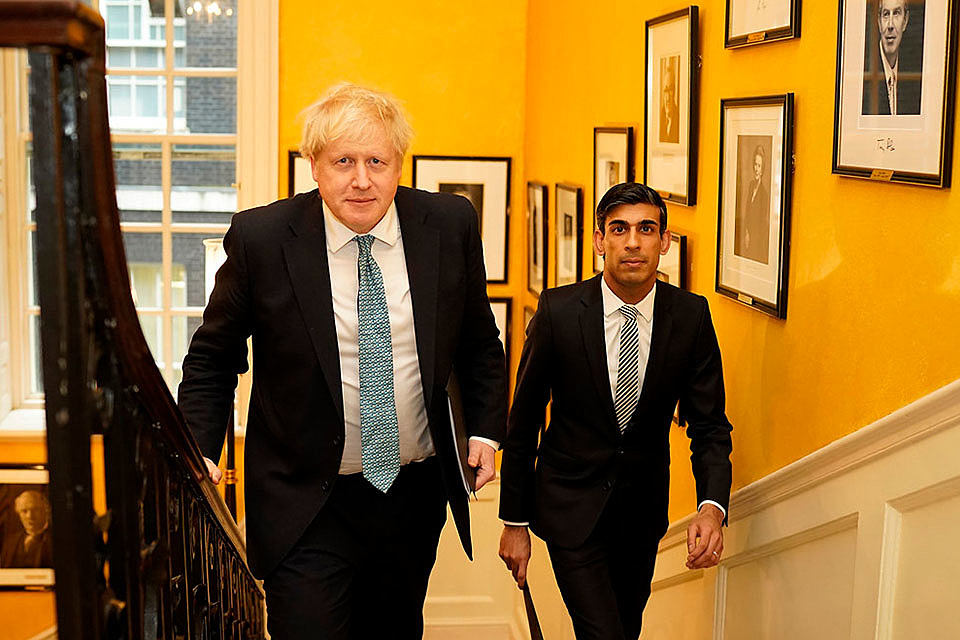
5.3. Resignation
On 5 July 2022, Rishi Sunak and Sajid Javid resigned from their cabinet positions almost simultaneously, triggering a major government crisis. Their resignations came amid a scandal surrounding Chris Pincher, who faced sexual harassment allegations. The controversy escalated after it was revealed that Prime Minister Boris Johnson had promoted Pincher to the position of Deputy Chief Whip despite being aware of the allegations.
Sunak was the second of 61 Conservative MPs to resign during the government crisis. He was succeeded as Chancellor by Nadhim Zahawi. Following the resignations of Sunak and Javid, numerous junior ministers and parliamentary private secretaries (PPS) also resigned, with most citing a lack of honesty and integrity on the part of Johnson. Within the subsequent 24 hours, 36 MPs resigned from their government roles, ultimately leading to Johnson's announcement of his own resignation.
In his resignation letter, Sunak articulated his reasons:
"The public rightly expect government to be conducted properly, competently and seriously. I recognise this may be my last ministerial job, but I believe these standards are worth fighting for and that is why I am resigning. It has become clear to me that our approaches are fundamentally too different. I am sad to be leaving Government but I have reluctantly come to the conclusion that we cannot continue like this."
6. Conservative Leadership Contests
Rishi Sunak participated in two Conservative Party leadership elections in 2022, first as a challenger to succeed Boris Johnson and then, after a brief period on the backbenches, as the successful candidate to replace Liz Truss.
6.1. July-September 2022 Election

On 8 July 2022, Sunak announced his candidacy in the leadership election to replace Boris Johnson. He launched his campaign with a video posted on social media, pledging to "restore trust, rebuild the economy and reunite the country." He articulated his core values as "patriotism, fairness, hard work" and also committed to "crack down on gender neutral language." During the campaign, Sunak's policy proposals included implementing tax cuts only once inflation was under control, temporarily scrapping the 5% VAT rate on household energy for one year, introducing a temporary 10 GBP fine for patients who failed to attend GP appointments, capping refugee numbers, and tightening the legal definition of asylum.
Sunak consistently received the most votes in each of the series of MP ballots, emerging with Liz Truss as the final two candidates on 20 July to be put forward to the party membership for the ultimate leadership vote. He secured 137 votes to Truss's 113 in the final round of MP voting. Throughout the contest, Sunak openly opposed Truss's economic plans, predicting they would lead to economic damage. He famously stated, "Liz, we have to be honest. Borrowing your way out of inflation isn't a plan, it's a fairytale." A spokesperson for Sunak further elaborated, arguing that Truss's proposals would involve "increasing borrowing to historic and dangerous levels, putting the public finances in serious jeopardy and plunging the economy into an inflation spiral."
In the final membership vote, Truss ultimately prevailed, receiving 57.4% of the vote (81,326 votes) compared to Sunak's 42.6% (60,399 votes), making her the new leader. Sunak responded by offering his support to Truss, stating, "It's right we now unite behind the new PM, Liz Truss, as she steers the country through difficult times." He spent the entirety of Truss's brief premiership on the backbenches.
6.2. October 2022 Election
As Sunak had predicted, Liz Truss's government introduced large-scale unfunded tax cuts and borrowing in a mini-budget on 23 September, which was widely criticized and rapidly led to significant financial instability, forcing a largely reversed policy course. This economic turmoil culminated in Truss announcing her resignation on 20 October 2022, amid a severe government crisis, triggering a new leadership contest.
On 22 October, it was reported that Sunak had successfully secured the required 100 supporters from among Conservative Members of Parliament to enter the ballot. The total number of MPs who publicly declared their support for him surpassed the threshold that afternoon. On 23 October, Sunak formally declared his intention to stand for election. Following the withdrawal of Boris Johnson from the race and Penny Mordaunt's subsequent decision to end her candidacy, Rishi Sunak was announced as the new leader of the Conservative Party unopposed on 24 October 2022.
7. Premiership (2022-2024)
During his premiership, Rishi Sunak focused on stabilizing the British economy and addressing key domestic and international challenges. His government implemented policies across various sectors, including cabinet appointments and reshuffles, economic and social reforms, immigration control, and environmental initiatives. On the foreign policy front, Sunak navigated complex global conflicts and strengthened bilateral relations, while also facing significant electoral challenges in local and general elections.
7.1. Cabinet and Reshuffles
Upon his appointment as Prime Minister, Sunak immediately began forming his cabinet, aiming to bring stability and unity to a party fractured by recent events.
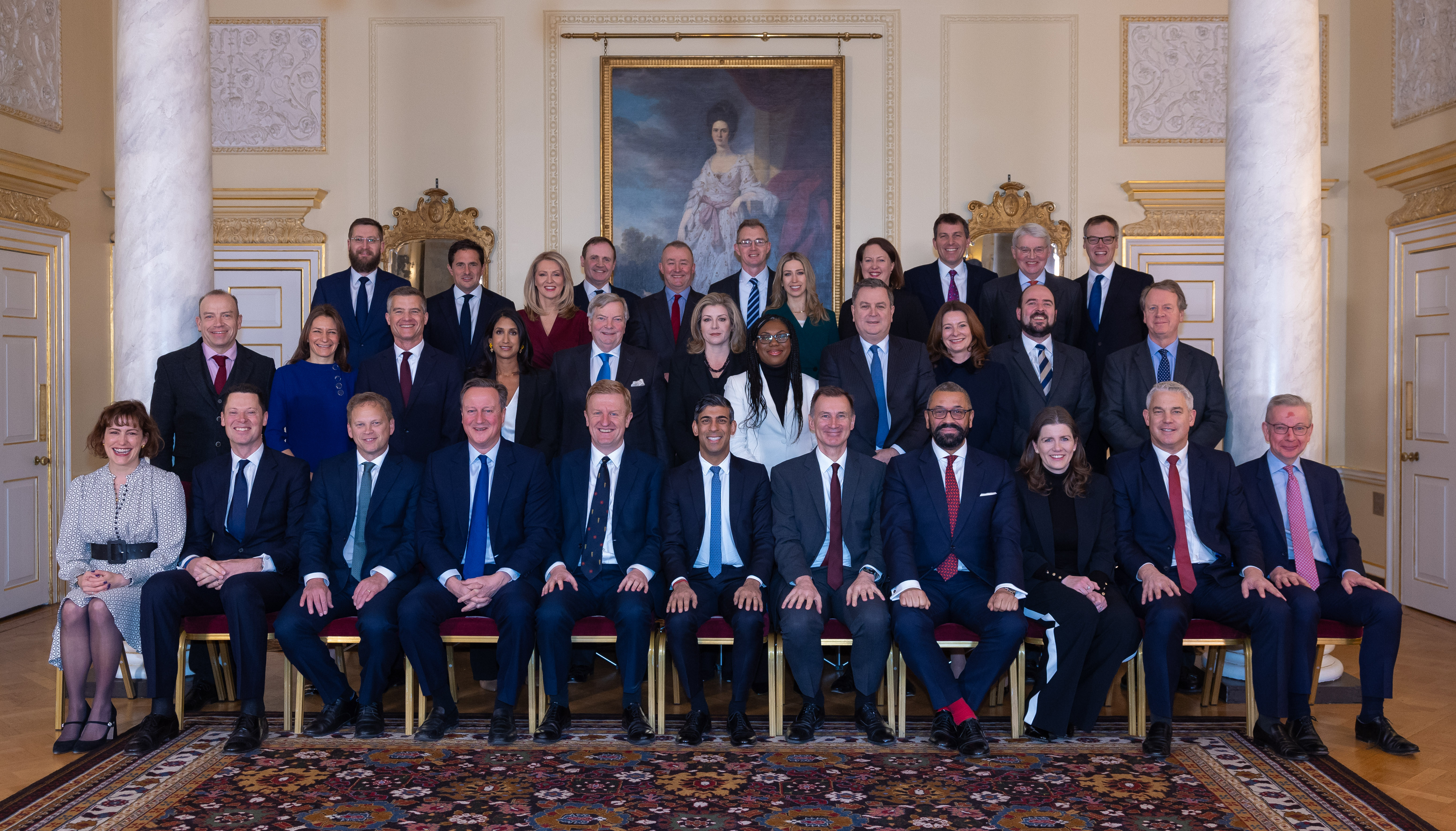
His initial cabinet, formed in October 2022, saw several key appointments:
- Jeremy Hunt was re-appointed as Chancellor of the Exchequer.
- Dominic Raab was re-appointed as Deputy Prime Minister and Justice Secretary. He later resigned from these roles in April 2023 and was replaced by Oliver Dowden.
- James Cleverly was appointed Foreign Secretary.
- Suella Braverman returned as Home Secretary.
- Ben Wallace was appointed Secretary of State for Defence.
- Michael Gove was appointed Levelling Up Secretary.
- Grant Shapps was appointed as Secretary of State for Business, Energy and Industrial Strategy.
- Penny Mordaunt became Leader of the House of Commons and Lord President of the Council.
- Other significant appointments included Simon Hart as Parliamentary Secretary to the Treasury and Chief Whip of the House of Commons, Nadhim Zahawi as Chairman of the Conservative Party, Oliver Dowden as Chancellor of the Duchy of Lancaster, Thérèse Coffey as Environment Secretary, Mel Stride as Work and Pensions Secretary, and Mark Harper as Transport Secretary.
Sunak faced criticism for some of his appointments, particularly for including Gavin Williamson and Dominic Raab, both of whom had faced accusations of bullying (which they denied). Williamson later resigned. Braverman's return to the cabinet, despite having previously resigned for a breach of the Ministerial Code, also drew scrutiny. Sunak defended his appointments by stating they reflected a "united party." In January 2023, Sunak dismissed Nadhim Zahawi as party chairman after an ethics adviser found a "serious breach" of the ministerial code, leading to further questions about Sunak's initial judgment in appointing him.
7.1.1. Reshuffles
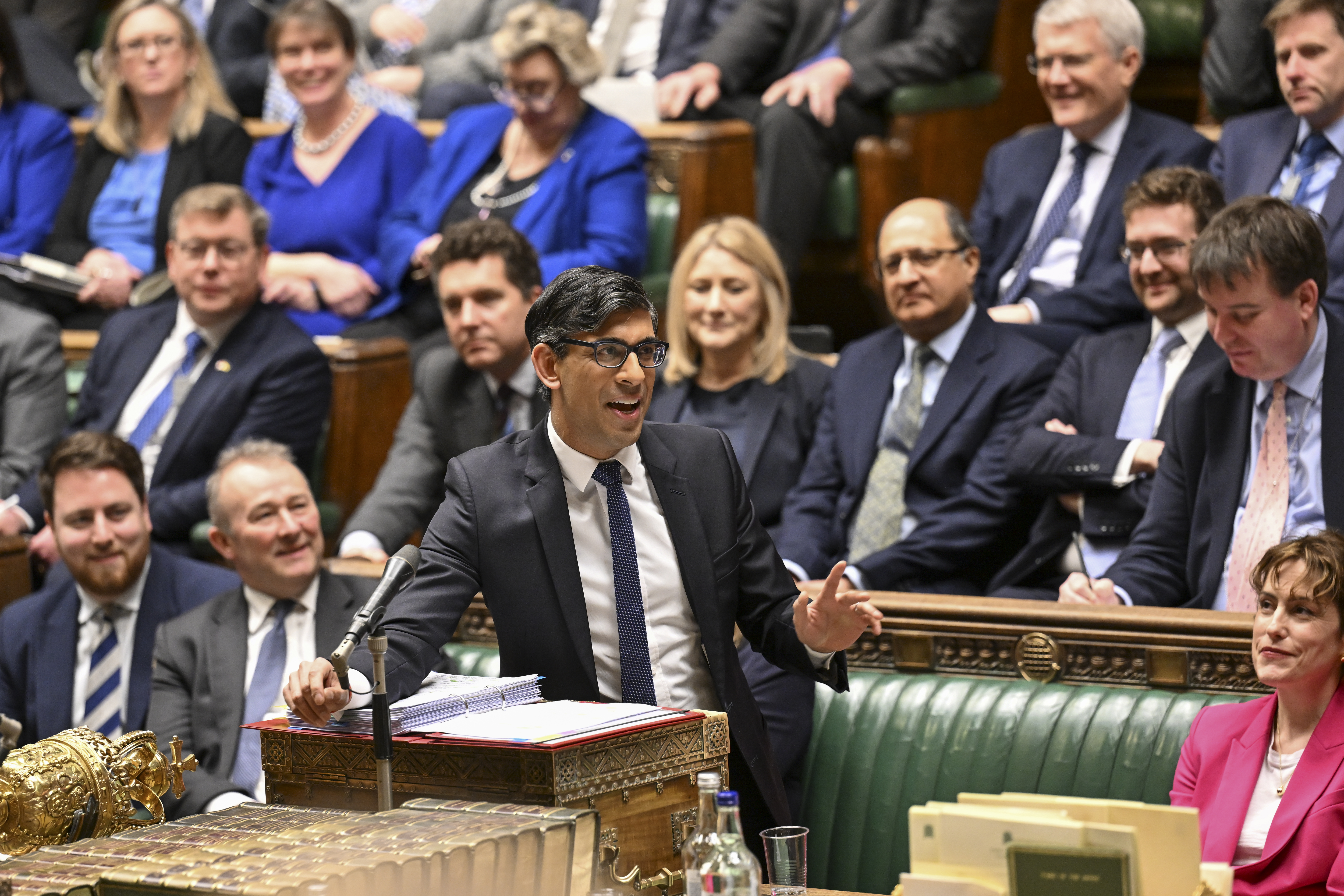
Sunak's first major cabinet reshuffle occurred in **February 2023**, leading to a significant restructuring of government departments. New departments were created, including the Department for Business and Trade, the Department for Energy Security and Net Zero, and the Department for Science, Innovation and Technology. The Department for International Trade and the Department for Business, Energy and Industrial Strategy were consequently split and merged into other departments. Ministers who joined the cabinet in this reshuffle included Greg Hands, who took over as party chairman from Zahawi (though he later resigned and was replaced by Richard Holden), Lucy Frazer, who became Secretary of State for Culture, Media and Sport, and Rachel Maclean, who joined the Department for Levelling Up, Housing and Communities from the backbenches.
His final cabinet reshuffle took place in **November 2023**. This reshuffle notably saw the return of former Prime Minister David Cameron to government, replacing James Cleverly as Foreign Secretary after a seven-year absence from frontline politics. The reshuffle also marked the departures of Braverman and Coffey from government, and Hands from the cabinet, while Laura Trott was appointed as Chief Secretary to the Treasury.
7.2. Domestic Policy
Sunak's government implemented policies aimed at addressing key domestic challenges, including economic management, the cost of living, public services, and environmental commitments, with varying social equity implications.
7.2.1. Economy and Cost of Living
Sunak's government prioritized economic stability and tackling inflation. He aimed to halve inflation, grow the economy, and cut national debt. His administration delivered several key financial statements, including the November 2022 autumn statement, the 2023 budget, the November 2023 autumn statement, and the March 2024 budget. These measures were intended to manage the economy and mitigate the impact of the cost-of-living crisis on households and vulnerable groups.
Throughout his premiership, the UK faced significant industrial disputes and strikes, including those involving postal workers, railway staff, and the National Health Service (NHS), reflecting ongoing economic pressures and social discontent. Sunak also aimed to reduce NHS waiting lists as one of his five key priorities.
7.2.2. Immigration and Asylum
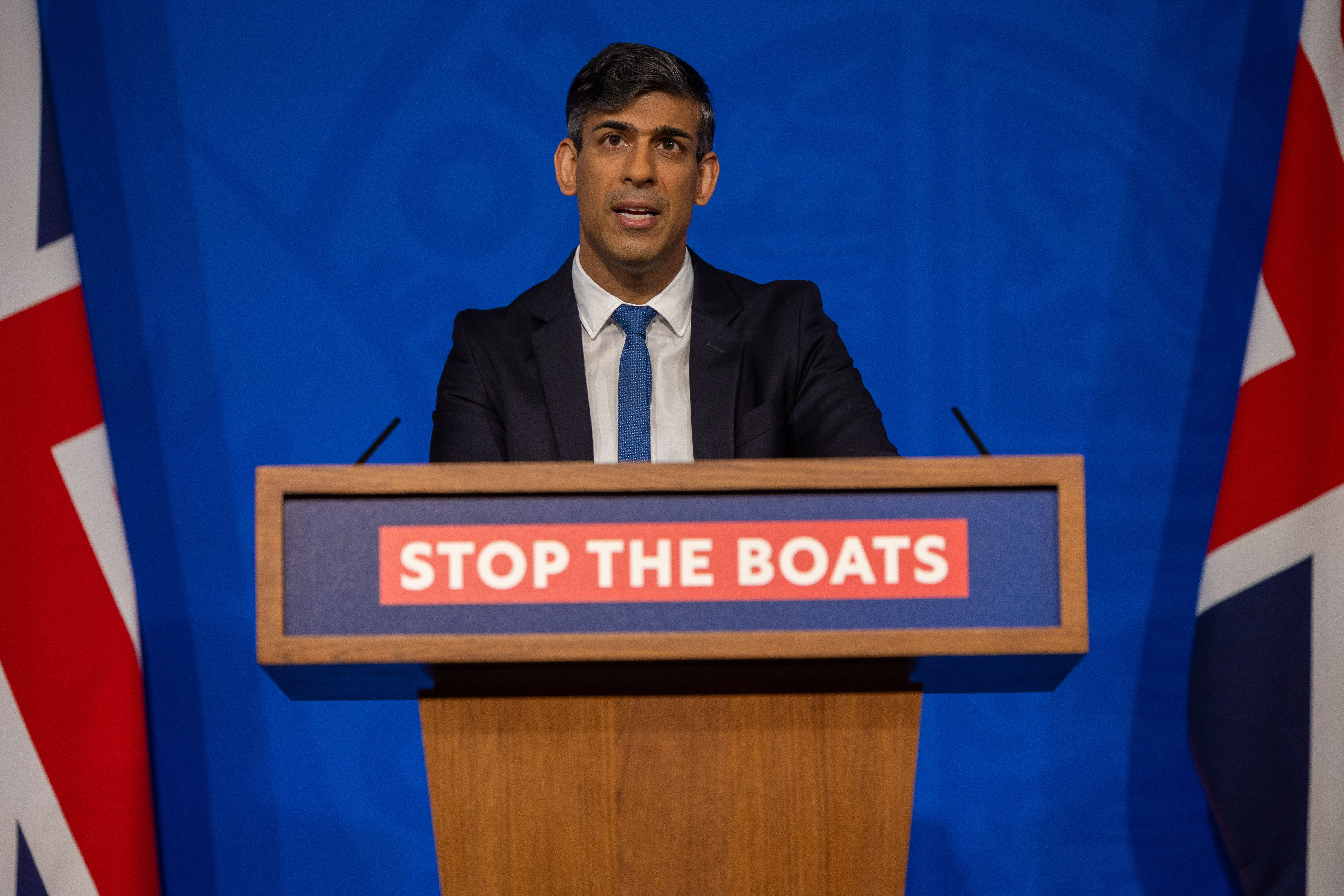
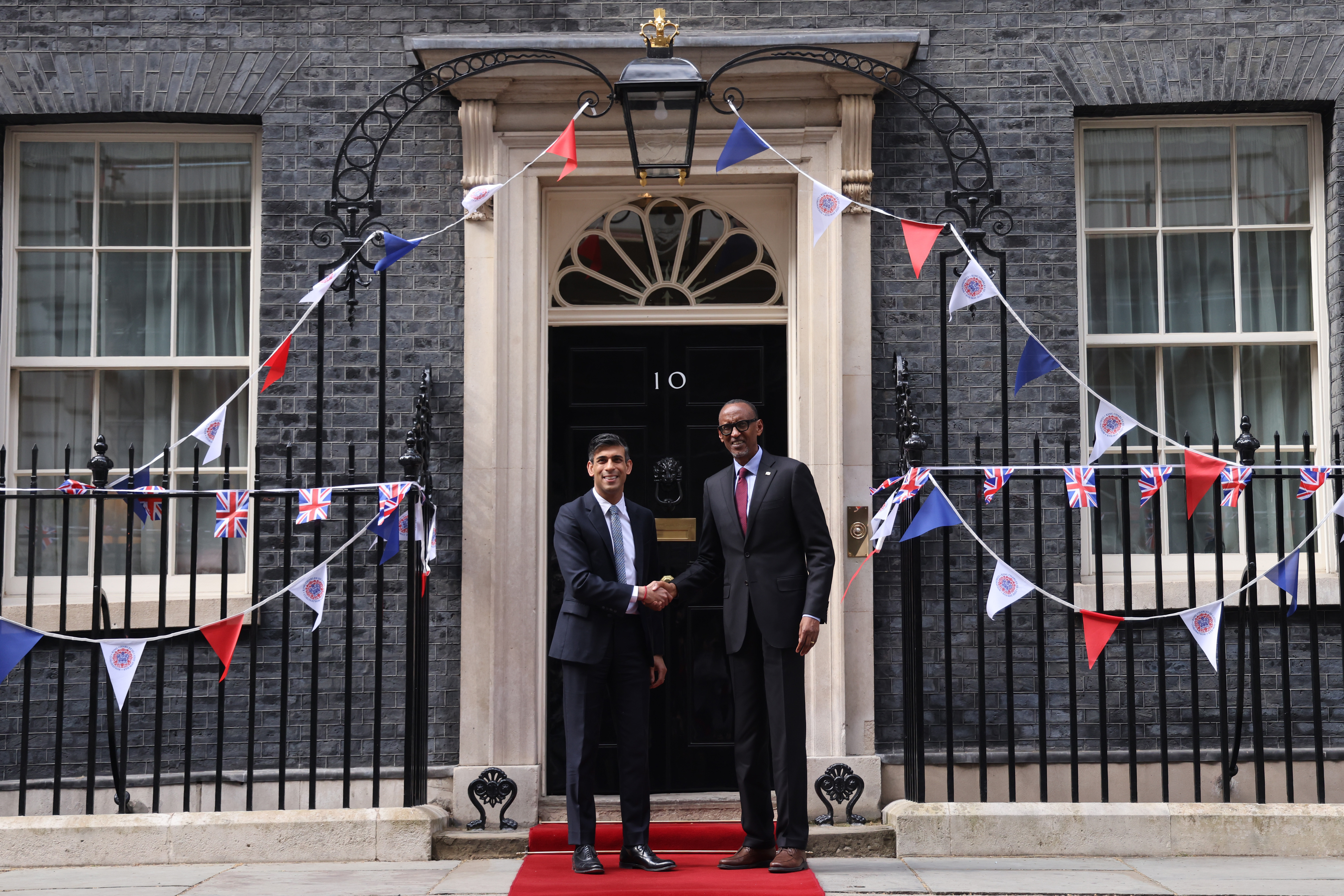
Sunak's government adopted a stringent approach to immigration, particularly focusing on stopping illegal crossings. While the Conservative Party's 2019 manifesto pledged to reduce net migration below 250,000 per year, Sunak stated in 2023 that the priority was not to reduce legal immigration but to halt illegal immigration. In 2023, nearly 30,000 undocumented migrants crossed the English Channel in small boats to the UK. Long-term net migration to the United Kingdom reached a record high of 764,000 in 2022, with legal immigration at 1.26 million and emigration at 493,000. Of the 1,218,000 legal migrants entering the UK in 2023, only 10% were EU Nationals.
Sunak continued the controversial Rwanda asylum plan, which sought to send asylum seekers and illegal immigrants to Rwanda for processing. The plan was blocked by the UK's Court of Appeal in June 2023 due to concerns over international law and the possibility of refoulement (the return of persons to a country where they may face persecution). Sunak vowed to appeal this verdict to the Supreme Court. On 15 November 2023, the Supreme Court upheld the ruling, declaring the plan unlawful.
In response, Sunak dispatched James Cleverly to Rwanda to negotiate a new treaty focused on preventing refoulement, which would require ratification by both the British and Rwandan Parliaments. His government also introduced the Safety of Rwanda (Asylum and Immigration) Bill, emergency legislation designed to grant ministers the power to disapply sections of the Human Rights Act 1998 and certain aspects of international law, thereby allowing them to declare Rwanda a safe country under UK law. This bill faced criticism from some on the right of his party for not going far enough, leading to the resignation of Immigration Minister Robert Jenrick. On 12 December 2023, Sunak secured a government majority of 44 for the Safety of Rwanda Bill, despite opposition from all other parties and abstentions from members of the European Research Group.
Sunak has asserted that the current asylum system is broken and requires urgent reform. He proposed strengthening the statutory definition of who qualifies for asylum in the UK to prevent individuals who entered illegally from remaining. He also advocated for parliamentary control over the number of refugees accepted annually and emphasized the importance of data sharing to facilitate the identification of illegal residents. He maintained that the Rwanda asylum plan was "the right one" and denied that his proposals were "racist" in nature.
7.2.3. Environmental Policy
Sunak's government maintained a commitment to environmental goals, though some policies drew scrutiny. He signed the Conservative Environment Pledge (CEP), an initiative by the Conservative Environment Network (CEN). The CEP outlined five key commitments: utilizing Brexit freedoms for environmental protection and sustainable agriculture, supporting UK clean energy suppliers to enhance energy security, encouraging the use of home insulation and electric vehicle charging points, rigorously enforcing environmental laws, and fostering technology for clean growth.
Sunak pledged to uphold the legal commitment to achieve net-zero emissions by 2050. He also articulated an ambition for the UK to achieve energy independence by 2045, advocating for increased offshore wind power, the installation of rooftop solar panels, and improved home insulation for energy efficiency. However, he voted against proposals for the UK to eliminate the majority of greenhouse gas emissions from transport by 2030.
Regarding fracking, Sunak initially expressed support if it had local backing and had voted against a fracking ban in October 2022. However, he later reversed his predecessor's policy, reinstating the fracking ban on 26 October 2022, aligning with the 2019 Conservative manifesto. As Chancellor, he attended COP26 in Glasgow, where he outlined three actions for climate finance: increasing public investment, mobilizing private finance, and restructuring the global financial system towards net-zero.
7.3. Foreign Policy
Sunak's government navigated a complex international landscape, responding to global conflicts, strengthening bilateral relationships, and addressing multilateral challenges.

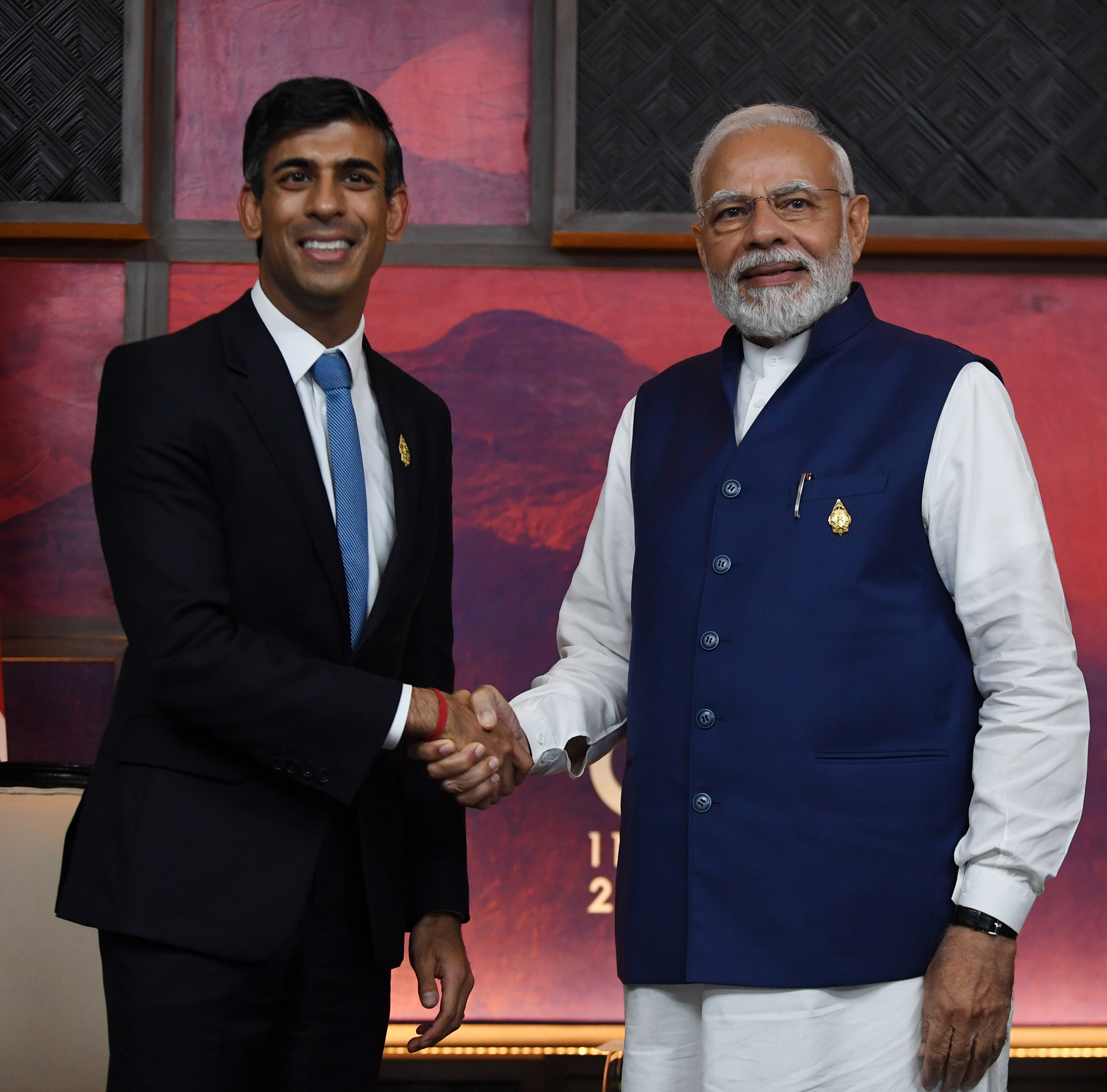
In **February 2023**, Sunak negotiated a proposed agreement with the European Union on Northern Ireland's trading arrangements, which was published as the Windsor Framework. He stated that the agreement "protects Northern Ireland's place in our Union." The proposed legislation passed a parliamentary vote on 22 March 2023 by 515 votes to 29, despite opposition from 22 Conservative MPs and six DUP MPs.
7.3.1. Russia and Ukraine
Sunak's government maintained strong support for Ukraine following the Russian invasion of Ukraine. After the 15 November 2022 missile explosion in Poland, Sunak met with US President Joe Biden and delivered a speech addressing the incident. He later met Ukrainian President Volodymyr Zelenskyy in Kyiv, pledging 50.00 M GBP in aid. Following their meeting, Sunak stated, "I am proud of how the UK stood with Ukraine from the very beginning. And I am here today to say the UK and our allies will continue to stand with Ukraine, as it fights to end this barbarous war and deliver a just peace."
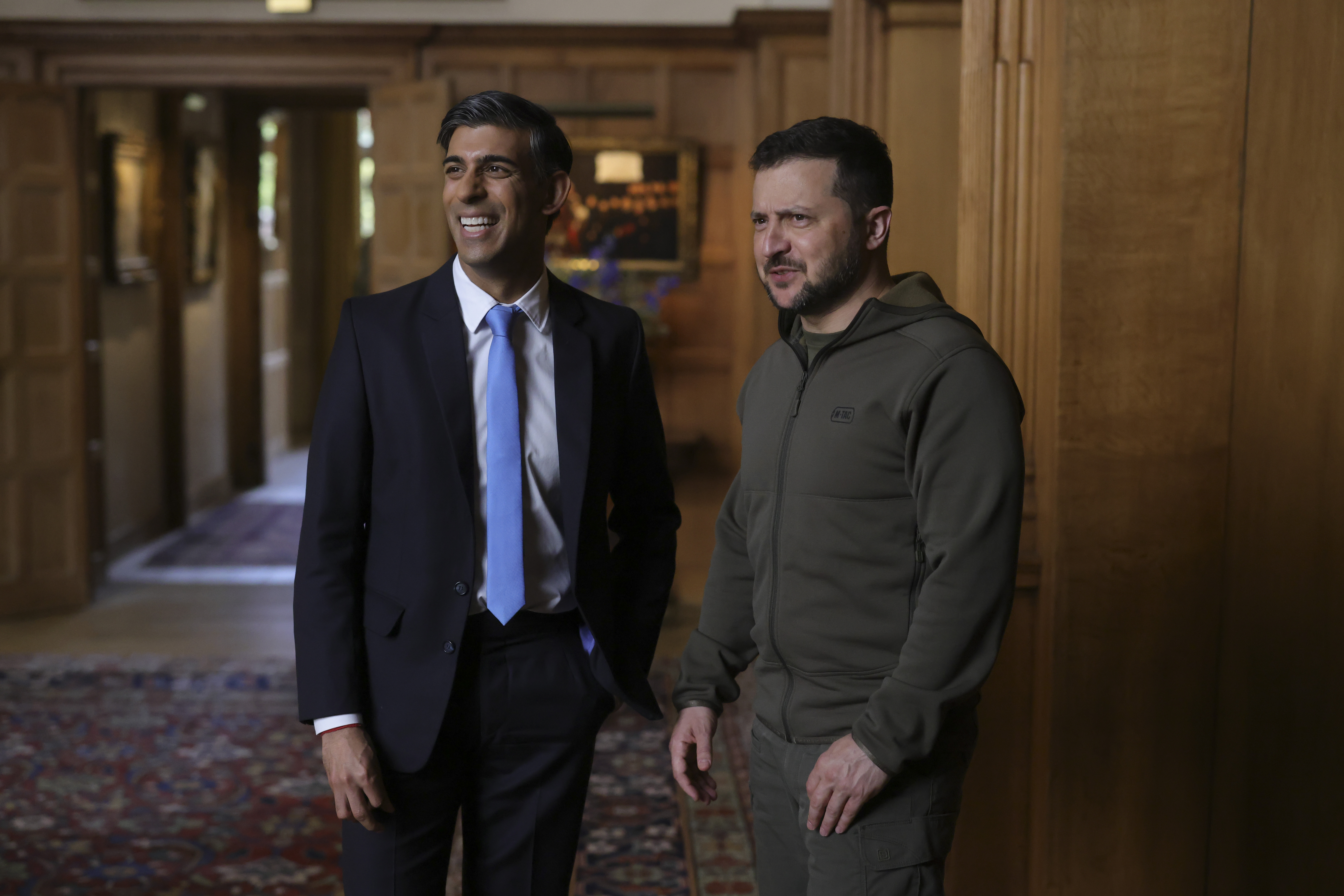
On 12 January 2024, Sunak visited Ukraine again to sign a new UK-Ukraine Agreement on Security Cooperation with President Zelenskyy. During this visit, he promised 2.50 B GBP in military aid to Ukraine, which included long-range missiles, artillery ammunition, air defence systems, and maritime security support. Additionally, 200.00 M GBP was allocated for military drones, making the UK the largest provider of drones to Ukraine, according to Downing Street. Sunak consistently supported Ukraine's resistance against Russian aggression and backed economic sanctions against Russia, while opposing direct British military intervention in Ukraine.
7.3.2. Israel and Palestine

In October 2023, following the surprise attack by Hamas on Israel that escalated into the Israel-Hamas war and a growing humanitarian crisis in the Gaza Strip, Sunak pledged the UK's support for Israel, declaring that Israel "has an absolute right to defend itself." He initially backed calls for humanitarian pauses to allow aid into Gaza but rejected calls for a full ceasefire, arguing it would only benefit Hamas.
Israel utilized British-supplied weapons in the conflict. However, Sunak later condemned the high number of civilian casualties in Gaza and shifted his stance to call for a "sustainable ceasefire," conditional on the return of all Israeli hostages, cessation of attacks against Israel, and the unimpeded flow of humanitarian aid into Gaza. His government consistently supported a two-state solution as a resolution to the conflict. When the International Criminal Court prosecutor Karim Ahmad Khan announced his intention to seek war crimes charges against Israeli Prime Minister Benjamin Netanyahu, Sunak criticized the move as "unhelpful" and accused Khan of drawing a moral equivalence between Israel and Hamas.
7.3.3. Other International Relations
Sunak's approach to other international relations evolved during his political career. During his 2022 Conservative leadership bid, he described China as the "biggest long-term threat" to the UK, citing human rights violations in Xinjiang and Hong Kong, economic manipulation, support for Vladimir Putin, technology theft, and infiltration of UK universities. However, after becoming Prime Minister, his rhetoric softened, referring to China as a "systemic challenge" rather than a "threat," and emphasizing the need to manage intense competition through diplomacy and engagement.
He characterized Saudi Arabia as a "partner" and "ally," asserting that the UK government does not overlook human rights violations there, but justified engagement as necessary for ensuring the UK's energy security. As Chancellor, he had opposed US President Joe Biden's proposal for a minimum 21% global corporate tax. Sunak's government also supported the recognition of Jerusalem as the capital of Israel.
In January 2023, during a visit by Japanese Prime Minister Fumio Kishida, Sunak signed the Japan-UK Reciprocal Access Agreement (RAA). This agreement aims to simplify procedures for military cooperation between the Japan Self-Defense Forces and the British Armed Forces, including ship visits and joint exercises, thereby enhancing bilateral security and defense cooperation. Downing Street hailed it as the "most significant UK-Japan defense agreement since the Anglo-Japanese Alliance of 1902," with some observers considering it a de facto revival of the alliance.
7.4. Local Election Results
Sunak faced the challenging task of rebuilding the Conservative Party's reputation, which had been significantly damaged by the numerous controversies and scandals of the previous year and the brief, tumultuous Truss ministry. While the party's poll ratings saw a slight recovery over the initial months of his premiership, they did not return to pre-Truss levels.
Sunak contested his first local elections as leader on 4 May 2023, where the Conservatives suffered heavy losses. Two months later, on 20 July 2023, the party lost two seats in by-elections: one to the Labour Party in Selby and Ainsty and another to the Liberal Democrats in Somerton and Frome. The party's fortunes remained largely unchanged throughout the following year, despite policy adjustments such as the shelving of the northern phase of HS2 in October. The Conservatives lost two further seats in by-elections on 15 February 2024.
In March 2024, there were suggestions that Sunak could face a leadership challenge before the upcoming general election if the Conservatives performed poorly in the local elections on 2 May. Sunak, however, stated his intention to resist any such challenge. As widely predicted, 2 May saw a grim showing for the Conservatives, who recorded their worst local election results since 1996. Additionally, they lost another seat to Labour in the Blackpool South by-election and narrowly lost the West Midlands mayoral election in a close vote. While Sunak's premiership was described as more stable than that of his two predecessors, it ultimately failed to represent a significant turnaround for the Conservative Party's electoral standing.
7.5. 2024 General Election and Resignation
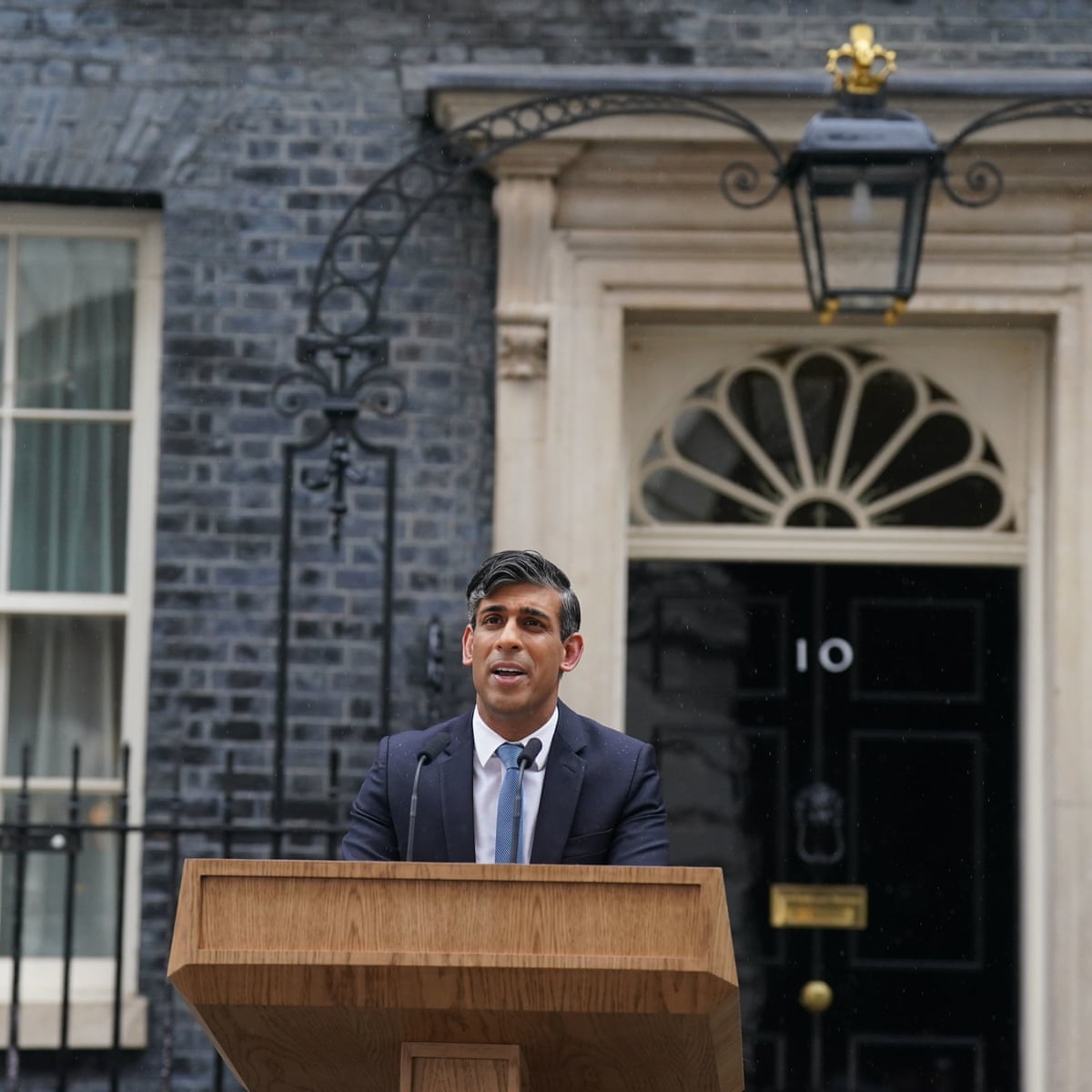
On the afternoon of 22 May 2024, Rishi Sunak unexpectedly announced that he had asked the King to call a general election for 4 July 2024, a decision that surprised many of his own MPs. Although Sunak had the option to wait until December 2024 to call the election, he stated his decision was based on his belief that the economy was improving, and that "falling inflation and net migration figures would reinforce the Conservatives' election message of 'sticking to the plan'."
During the campaign, Sunak sought to rebuild the Conservative Party's reputation, which had suffered a slump in popularity after the short-lived Truss ministry and a series of controversies, including Partygate, that had severely damaged Johnson's government. His campaign focused on stabilizing the economy, implementing the Rwanda asylum plan, further strengthening the State Pension, and introducing National Service. On 11 June, he released the Conservative manifesto, titled Clear Plan. Bold Action. Secure Future., which addressed a wide range of policy areas including the economy, taxes, welfare, expanding free childcare, education, healthcare, environment, energy, transport, and crime. Sunak publicly stated during the general election campaign that if his party lost the election, he intended to remain as a backbench MP for the next five years.
A notable controversy during the campaign occurred on 6 June 2024, the 80th anniversary of the D-Day commemorations. Sunak faced heavy criticism for leaving the events early to conduct an interview with ITV, drawing condemnation from veterans and political commentators alike. He apologized three times over the following week for his absence.
The general election resulted in a landslide victory for the Labour Party, ending 14 years of Conservative government. A record number of Conservative MPs either stood down or lost their seats in the election. Three cabinet members stood down, and eight full members and four who attended Cabinet lost their seats, marking the highest number of sitting cabinet seat losses in history. Sunak conceded the election on 5 July. In his resignation speech before tendering his resignation to the King, Sunak apologized to Conservative voters and candidates for the party's heavy defeat. He announced his intention to resign as party leader once a new leader was elected and offered his support to the incoming Prime Minister Keir Starmer, describing him as "a decent, public-spirited man" whom he respected, and expressed hope for his success.
Sunak stated:
"To all the Conservative candidates and campaigners who worked tirelessly but without success, I am sorry that we could not deliver what your efforts deserved. It pains me to think how many good colleagues, who contributed so much to their communities and our country, will now no longer sit in the House of Commons. I thank them for their hard work, and their service. Following this result, I will step down as party leader, not immediately, but once the formal arrangements for selecting my successor are in place. It is important that after 14 years in government the Conservative Party rebuilds, but also that it takes up its crucial role in Opposition professionally and effectively."
8. Post-Premiership
Following his departure from Downing Street, Rishi Sunak transitioned into a new role within British politics, initially leading the opposition before stepping down as party leader.
8.1. Leader of the Opposition

After Keir Starmer succeeded Sunak as Prime Minister, Sunak immediately became Leader of the Opposition and formed his shadow cabinet on 8 July 2024. Most members of Sunak's cabinet from before the 2024 general election were given the same portfolios in the shadow cabinet. This included former Chancellor Jeremy Hunt, who became shadow chancellor, and former Home Secretary James Cleverly, who became shadow home secretary. Former Foreign Secretary David Cameron chose to retire from frontline politics, with his former deputy Andrew Mitchell becoming shadow foreign secretary instead. Richard Holden resigned as party chairman and was succeeded by Richard Fuller in an interim capacity outside the shadow cabinet.
Sunak appointed new officeholders to the portfolios previously held by the eleven cabinet ministers who lost their seats in the election. These appointments included Edward Argar as shadow justice secretary (replacing Alex Chalk) and Helen Whately as shadow transport secretary (replacing Mark Harper). Among other notable appointments, Kemi Badenoch became the shadow housing, communities and local government secretary, and former Deputy Prime Minister Oliver Dowden became deputy leader of the opposition.
Sunak remained Leader of the Opposition until his successor, Kemi Badenoch, was elected in the 2024 Conservative Party leadership election on 2 November 2024, after which he returned to the backbenches. Responding to the 2024 State Opening of Parliament, Sunak stated that his party would not oppose the government "for the sake of it," but would hold them accountable on their election promises. Regarding proposals to change planning laws, Sunak cautioned that while such changes were needed, "a system that does not allow local people to have a say will damage public consent for more housing in the long term." While he respected Starmer's decision to scrap the Rwanda asylum plan, Sunak emphasized that an alternative deterrent was necessary, otherwise "a large number of those who crossed the Channel illegally will end up remaining here."
In a speech reflecting on his rapid political trajectory, Sunak remarked:
"On the Government benches life comes at you fast. Soon, you might be fortunate enough to be tapped on the shoulder and be offered a junior ministerial role, then you'll find yourself attending cabinet, then in the cabinet and then when the prime minister's position becomes untenable you might end up being called to the highest office. And, before you know it, you have a bright future behind you and you're left wondering whether you can credibly be an elder statesman at the age of 44."
8.2. Other Activities
After leaving frontline politics, Sunak has taken on several new roles. In January 2025, he became a visiting fellow at the Hoover Institution of Stanford University and a distinguished fellow at the Blavatnik School of Government at the University of Oxford. He also signed as an exclusive speaker with the Washington Speakers Bureau. In March 2025, Sunak and his wife, Akshata Murty, founded a charity named The Richmond Project, which aims to improve numeracy skills among schoolchildren and adults.
9. Political Positions and Ideology
Rishi Sunak's political ideology has been subject to varying interpretations, often described as a blend of pragmatism and social conservatism, positioning him distinctly within the Conservative Party.
He has frequently been characterized as a moderate within his party, known for a technocratic or managerial leadership style. According to Euronews, Sunak is "frequently perceived as a pragmatist and as belonging to the centre-ground of the Conservative Party." He notably opposed the economic policies of Liz Truss, and while he is often described as a fellow Thatcherite, he is generally viewed as less economically liberal than Truss.
However, in April 2023, his perception as a centrist was contrasted with descriptions of his government's policies on transgender and migration issues as being socially conservative. Jessica Elgot of The Guardian described Sunak as "perhaps the most socially conservative PM of his generation." Robert Shrimsley of the Financial Times noted that while Sunak's "easy manner, career in global finance and ethnic background might suggest a more cosmopolitan conservative," he is in practice both socially conservative and pragmatic. The New Statesman observed that Sunak uneasily straddles both liberal-conservative and national-conservative instincts. By July 2023, The Economist went further, describing him as "the most right-wing Conservative prime minister since Margaret Thatcher."
On **crime**, Sunak proposed automatically extending the prison sentences of repeat offenders by one year. He also suggested shortening the minimum sentence for foreign criminals eligible for deportation from 12 months to six months. Furthermore, he advocated for life sentences for leaders of child trafficking organizations and for police to record the ethnic characteristics of individuals involved in such organizations.
Regarding **LGBT rights**, in a July 2022 debate, Sunak stated his desire for the UK to be "the safest and LGBT+ country." When questioned about accusations of transphobia within the party, he affirmed, "prejudice against trans people is wrong. The Conservative Party is an open and welcoming family to everyone across society, whoever they are, whatever their background." While he believes transgender people should be "respected," he also stated that biological sex is "important" and "fundamental" when considering issues such as toilets and competitive sports.
10. Public Image and Reception
Rishi Sunak's public image underwent significant shifts throughout his political career, from a relatively unknown figure to a highly popular Chancellor during the early pandemic, followed by a decline in approval, and a final dip during his premiership.
Upon his appointment as Chancellor, Sunak emerged into public discourse from relative obscurity. Some political commentators viewed his appointment as a signal of the end of the Treasury's independence from Downing Street. Robert Shrimsley, chief political commentator of the Financial Times, argued that "good government often depends on senior ministers - and the Chancellor in particular - being able to fight bad ideas."
In the early stages of the COVID-19 pandemic, Sunak enjoyed high approval ratings, described by one analyst as having "better ratings than any politician since the heydays of Tony Blair." Various polls indicated his widespread popularity among Conservative supporters and many other Britons throughout 2020. An Ipsos MORI poll in September 2020 showed Sunak with the highest satisfaction score of any British Chancellor since Labour's Denis Healey in April 1978, leading many to view him as the favourite to become the next Conservative leader. He even developed a "cult media following," earning the nickname "Dishi Rishi" due to widespread jokes and gossip about his attractiveness on social media and in magazines.
Public attitudes towards Sunak remained broadly positive into 2021, though his popularity began to decline steadily over time. By early 2022, as the cost of living crisis became a dominant public concern, Sunak's response as Chancellor was perceived as inadequate, leading to some of his lowest approval ratings. This decline continued as his family's financial affairs, including his wife's non-domiciled tax status and his own former US green card status, came under public scrutiny. By the time he resigned as Chancellor in July 2022, his approval ratings had slightly recovered.
In October 2022, following his appointment as Prime Minister, Sunak's personal favourability ratings saw an initial boost. However, by July 2023, his approval ratings had decreased back to a level similar to when he resigned as Chancellor. The New Statesman named him the second most powerful right-wing figure of 2023, behind only Nigel Farage. By the time of his resignation as Prime Minister in July 2024, he had recorded his lowest approval ratings to date. Despite the electoral defeat, Sunak received praise for his gracious concession speech after the 2024 general election, with some commentators even suggesting the Conservatives should retain him as leader.
11. Personal Life
Rishi Sunak's personal life, including his family, wealth, and cultural identity, has often intersected with his public persona and political career.
11.1. Family and Marriage
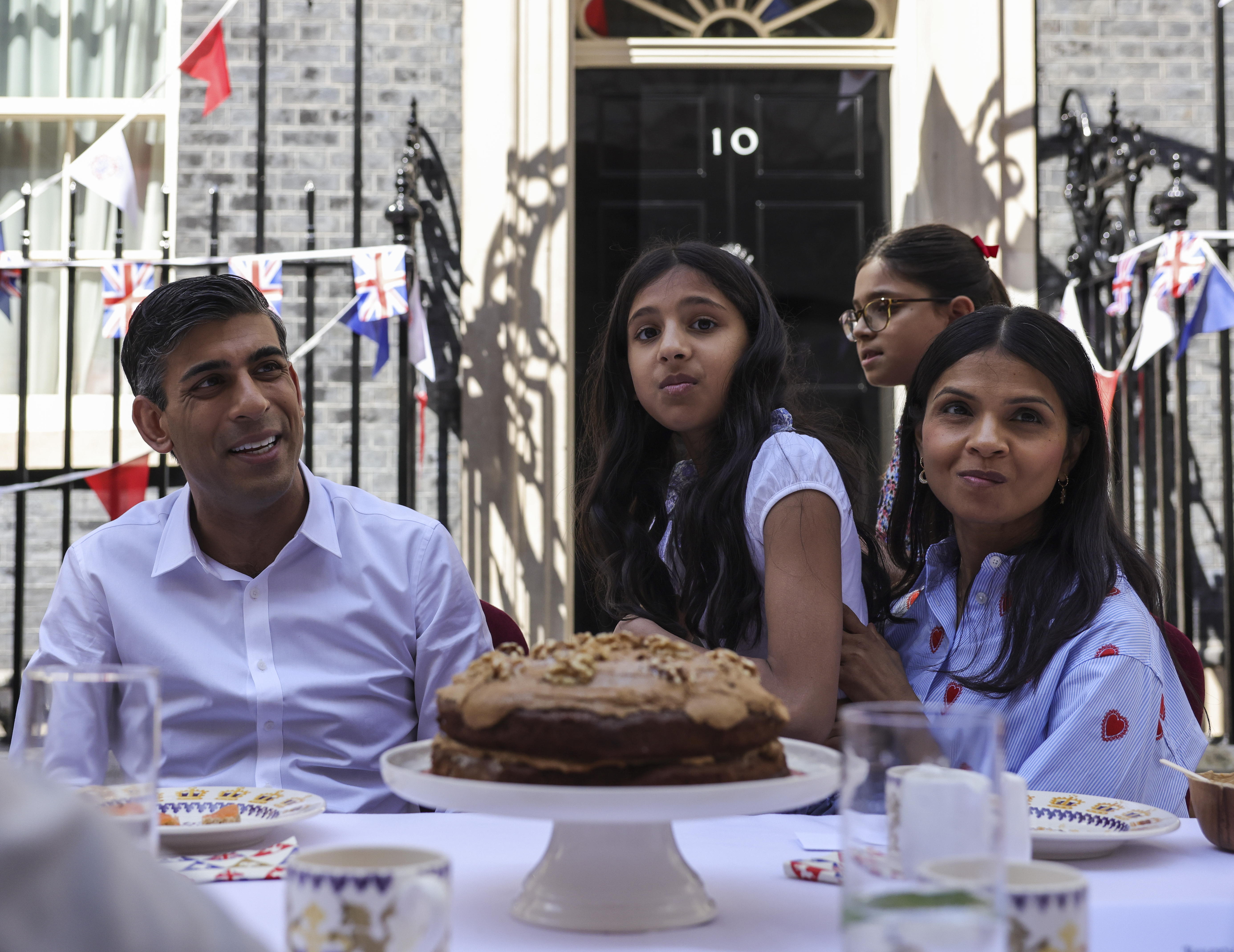
In August 2009, Rishi Sunak married Akshata Murty. They met while studying at Stanford University in the United States, and he proposed to her on a cliff near the Ritz-Carlton Half Moon Bay. Akshata Murty is the daughter of N. R. Narayana Murthy, the founder of the technology company Infosys, in which she holds a significant stake, and Sudha Murty. Sunak and Murty have two daughters, Krishna (born in 2011) and Anoushka (born in 2013).
11.2. Wealth and Financial Matters
Sunak and Murty are among the wealthiest individuals in Britain, with a combined fortune estimated at 730.00 M GBP as of 2022. In November 2020, The Guardian reported that Sunak had not declared a significant portion of his wife and family's financial interests, including a combined 1.70 B GBP shareholding in Infosys, on the register of ministers' interests. Ministers are required to declare interests "relevant" to their responsibilities and those that "might be thought to give rise to a conflict" with their public duties. An independent adviser later investigated and concluded that Sunak had not broken any rules.
In early 2022, newspapers revealed that Murty held non-domiciled status, which meant she was not required to pay UK tax on income earned abroad while residing in the UK. This status, which cost approximately 30.00 K GBP to secure, reportedly allowed her to avoid paying an estimated 20.00 M GBP in UK taxes. On 8 April, Murty issued a statement announcing that she would begin paying UK taxes on her global income, expressing regret that the issue had become "a distraction for [her] husband." An inquiry was subsequently launched to identify the source of the leak regarding her tax status. Around the same time, it was also reported that Sunak had maintained his United States permanent resident (green card) status, which he acquired in the 2000s, until 2021, including for 18 months after he was appointed Chancellor. This status required him to file annual US tax returns. An investigation into both his wife's tax status and his residency status concluded that Sunak had not violated any ministerial rules.
Sunak and Murty own several properties, including a house in North Yorkshire; a mews house in Earl's Court in central London; a flat on Old Brompton Road, South Kensington; and a penthouse apartment on Ocean Avenue in Santa Monica, California. In April 2022, reports indicated that Sunak and Murty had moved out of the flat above 10 Downing Street to a newly refurbished West London home for domestic reasons. However, in October 2022, upon his appointment as Prime Minister, the Sunaks resumed residence in their former official home at 10 Downing Street, reversing a trend initiated in 1997 where prime ministers typically resided in the four-bedroom flat above 11 Downing Street. In August 2023, Sunak and his family took their first holiday in nearly four years, spending 10 days in Santa Monica, where they visited the Santa Monica Pier and Disneyland, and attended a concert by Taylor Swift as part of The Eras Tour.
11.3. Religion and Cultural Identity
Sunak is a Hindu and identifies as British Indian. He has stated that he is "thoroughly British" but also cherishes his Indian religious and cultural heritage. When taking his oath as an MP at the House of Commons, he did so on the Bhagavad Gita. During the coronation of King Charles III in May 2023, Sunak, as Prime Minister, gave a reading from the New Testament book of Epistle to the Colossians (Colossians 1:9-17), in keeping with the tradition of British Prime Ministers giving readings at state occasions. Following the murder of George Floyd, Sunak publicly shared that he too had experienced racism in his life. Speaking about his childhood during the 2024 general election campaign, Sunak mentioned that his parents "wanted to put everything into our education and that was a priority" and that he did not have Sky TV growing up.
11.4. Controversies and Criticisms
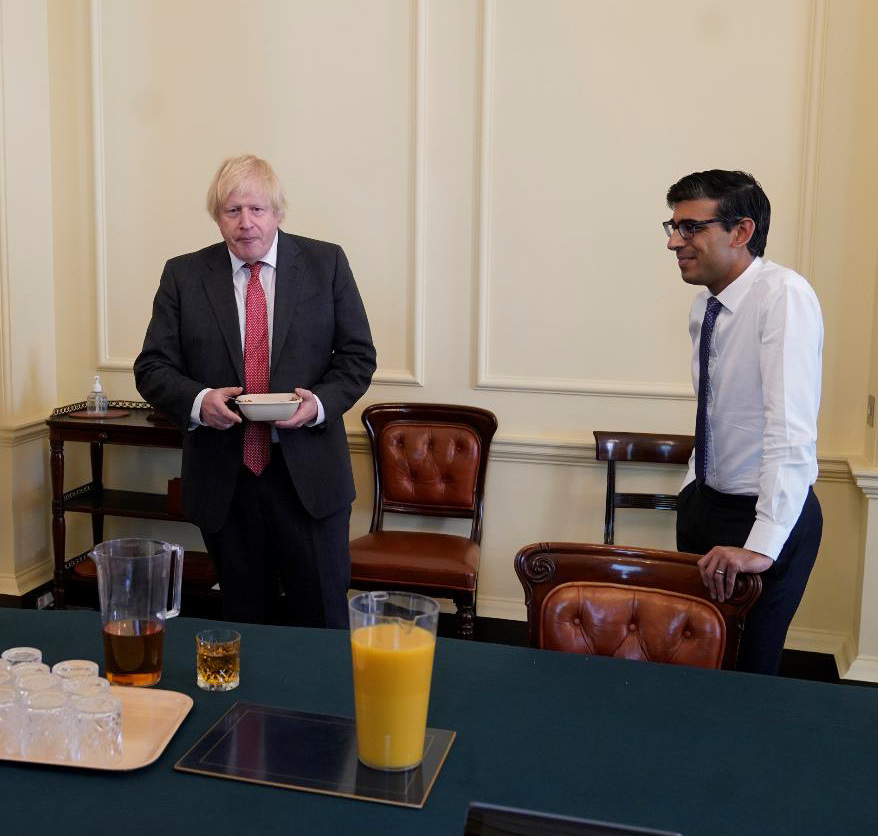
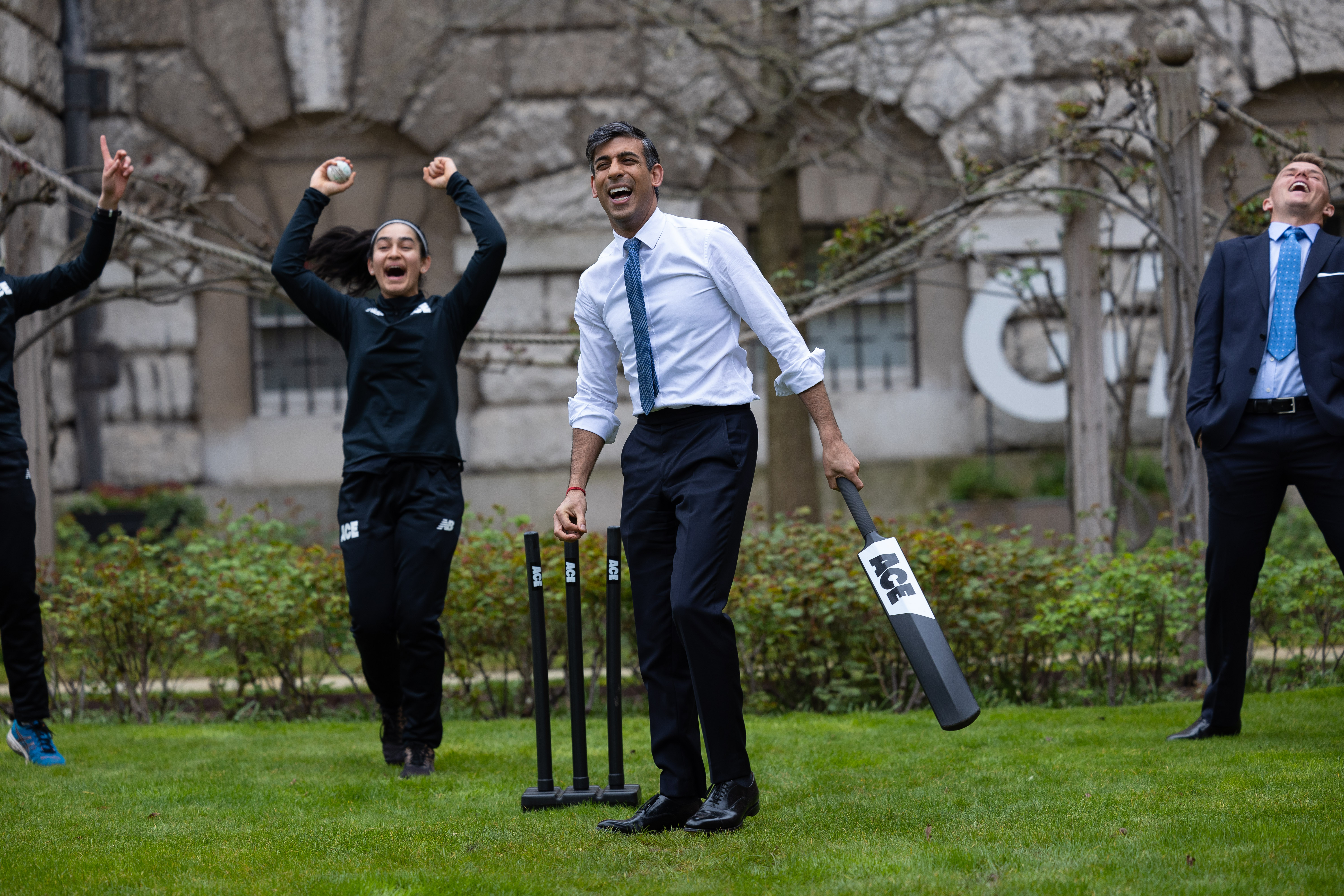
In April 2022, amid the Partygate scandal, Sunak was issued a fixed penalty notice by the police. The police determined he had committed offenses under COVID-19 regulations by attending a birthday gathering for Boris Johnson on 19 June 2020. The police also issued 125 fixed penalty notices to 82 other individuals, including Johnson and his wife Carrie Symonds, all of whom apologized and paid the penalties. After receiving the penalty notice, Sunak stated he was "extremely and sincerely sorry" for the hurt caused by his attendance at the party and respected the police's decision to issue the fine.
In January 2023, Sunak was issued another fixed penalty notice by Lancashire Constabulary after a social media video showed him failing to wear a seat belt in a moving vehicle. Sunak apologized for the incident, describing it as a "brief error of judgment."
Sunak is a teetotaller. He has mentioned having seven dental fillings due to excessive consumption of Coca-Cola when he was younger, and he has expressed a strong preference for Mexican Coke. He previously served as a governor of the East London Science School. Sunak owns a Labrador named Nova and is an enthusiast of cricket and horse racing. He has played cricket, demonstrating skills in both batting and bowling, and has cited the legendary Indian cricketer Rahul Dravid as one of his favourite players. He grew up watching players like Robin Smith and Malcolm Marshall. As Chancellor, he reportedly woke early for a daily Peloton workout and was a fan of fitness instructor Cody Rigsby. Sunak is a close friend of James Forsyth, the former political editor of The Spectator, whom he has known since their school days. Sunak served as the best man at Forsyth's wedding to journalist Allegra Stratton, and they are godparents to each other's children. He appointed Forsyth as his political secretary in December 2022. Sunak is a steadfast fan of Southampton F.C., and when asked about his ideal job outside politics, he replied that if he could "run Southampton Football Club" he would be a "very happy man."
12. Influence and Legacy
Rishi Sunak's influence and legacy are complex, shaped by his efforts to stabilize the British economy amidst unprecedented challenges and his attempts to redefine the Conservative Party's direction, particularly through a lens that considers social impact and human rights.
As Chancellor, Sunak's rapid and extensive financial interventions during the COVID-19 pandemic, such as the furlough scheme, were widely credited with mitigating immediate economic collapse and protecting jobs. However, the long-term social and economic impacts of these measures, including their cost-effectiveness and the gaps in support for certain demographics, remain subjects of critical analysis. His budgets, which included the first corporation tax increase in decades, signaled a departure from traditional Conservative fiscal policy, aiming for greater fiscal responsibility but also impacting business and individual tax burdens.
During his premiership, Sunak sought to bring stability after a period of intense political turmoil. His focus on economic recovery and tackling inflation was central, but the ongoing cost-of-living crisis continued to exert significant pressure on households, raising questions about the social equity of his economic management. His immigration policies, particularly the controversial Rwanda asylum plan, have drawn strong criticism from human rights organizations and legal experts for their potential impact on international law and the treatment of vulnerable individuals. While he articulated a commitment to human rights, the implementation of these policies has been viewed by many as a significant challenge to democratic and humanitarian principles.
In foreign policy, Sunak's strong support for Ukraine and efforts to strengthen alliances, such as the Windsor Framework with the EU and the Reciprocal Access Agreement with Japan, marked a period of active international engagement. However, his government's stance on the Israel-Hamas war, including the continued supply of British-made weapons to Israel and his criticism of the International Criminal Court's actions, has been scrutinized for its humanitarian implications and alignment with international solidarity.
Ultimately, Sunak's leadership, while bringing a degree of calm compared to his immediate predecessors, was unable to reverse the Conservative Party's declining electoral fortunes. The landslide defeat in the 2024 general election underscored the public's desire for change, reflecting a broader societal assessment of the party's direction and the impact of its policies on social progress and human rights. His legacy is likely to be defined by his navigation of severe economic crises, his socially conservative policy stances on issues like immigration and gender, and his role in the Conservative Party's transition from government to opposition.